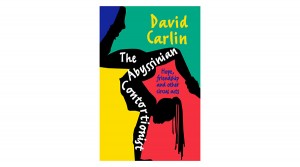I am delighted to be able to launch David’s book here in Adelaide – particularly as so many of you will remember him from his previous life as a South Australian playwright and theatre director.
David’s first acclaimed book, Our Father Who Wasn’t There, was connected to his early theatre writings performed at the Red Shed, but The Abyssinian Contortionist is a new departure. It is – as he describes it – his first not-me book.
I got so much pleasure from reading the unexpected twists and turns of this story – particularly when I reached the heart of the book, David’s second visit to Ethiopia -that I don’t want to give too much away.
The book is the result of several years’ collaboration between Sosina Wogayehu and David Carlin. She suggested the project. He responded by asking:
“Why do you want me to tell your story in a book?”
She replied:
“Because people don’t see me for who I am”.
By which she meant that in Australia, she is defined by all the clichés that stick to Ethiopian refugees: starvation, famine, elephants, tigers…
David was drawn to her story precisely because ‘she continually confounds expectations’ and he tells us, his readers, ‘ I want you to share the glorious surprise of seeing things from another side’.
They met when they were both working for Circus Oz – he as the director, and she as a contortionist and juggler bouncing eight balls on a block of marble.
Reading her life story, it is clear that these skills extend beyond the literal.
Her journey as an artist from Addis Ababa to Australia involves plenty of shape changing and juggling of bureaucracies. She has this extraordinary driving energy that carries everyone, including David, along with her.
At the beginning of the book, the story of her family is told in a series of fables. David says he hears it in this way, but the closer he gets to Addis Ababa, her culture, and her extended family, the less like a fable it becomes. Through this process of familiarization, David peels away all of the imaginary Africas that have been deposited in his mind and come unbidden into his thoughts:
his earliest memories sitting crossed legged with an encyclopedia on his lap looking at the wild beasts of Africa;
the colonial history of the European Scramble for Africa;
the past of Ethiopia with the Queen of Sheba and Haile Selassie;
the 1920s and the impact of African art on European modernism;
and finally to Josephine Baker, the black American performer Hemingway described as the ‘most sensational woman anyone ever saw’ – which brings readers full circle, as it was hearing about Josephine Baker that inspired Sosi to create a new act for Circus Oz.
While the book was being written, Sosina read drafts and David put ticks against the bits that she liked. He tells us “She likes it when I’m honest”. And I think this is what is so extraordinary about this book, because he is there with us all the time in the story, never shaping the action, but responding with an emotional and intellectual honesty that is breath-taking – particularly as he had no way of knowing when the project began that telling Sosi’s story would involve confronting the ‘power of grief and death’ that echoes from his earlier me-writing.
In a very understated way, this is a book for our times. When it acknowledges the plight of today’s asylum seekers:
it is in Sosi’s ‘quiet’ reflective voice as she contrasts her own experiences of seeking asylum in the 90s with the situation today;
it is in David’s fantasy of face-to-face meetings that bring average conservative Australians together with individual asylum seekers;
it is in the blunt question David is asked in Ethiopia – “Why is it so much harder to go to Australia than to America or Canada or Britain or other countries?”
… a question to which he can give no satisfactory answer.
Yet in this story of Sosi, Young Victorian of the Year and nominee for the Australia Day Awards, told by this ‘pasty white boy’ from Perth, there is a challenge to the geography of power, which David, in one of his glorious metaphors, describes as: ‘the invisible fence that zigzags the world’.
Before you buy the book and get it signed, please relax, and get comfortable, because David is going to read to us from The Abyssinian Contortionist.
The Abyssinian Contortionist can be ordered from the New Internationalist shop
Book Club notes are available for download

